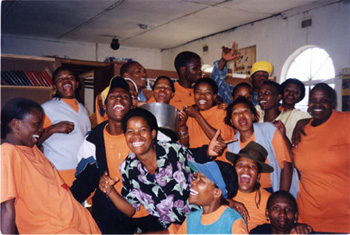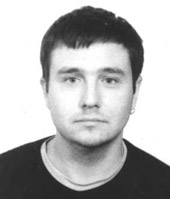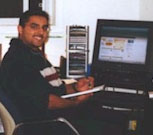|
Vancouver District Student Council
Nathan Lusiganan
VANCOUVER
Nathan Lusiganan has presided over the Vancouver District Student Council (VDSC) since its inception. He felt the need for student voice and involvement at the Vancouver School Board, the city level, provincial level, and the community in general. The goal in mind was to establish an organization that would enable students to talk about common issues while being a legitimate, non-partisan representative of students across the city. Prior to this no such organization existed. Through the VDSC, students have been involved with the Board of Trade Youth Task force, other youth organizations, and charity organizations. VDSC members are routinely exposed to workshops on subjects from leadership to planetary responsibility. Recently, the VDSC sent six delegates to an international conference in Toronto on Conflict Resolution and Peace Building. Also, during a teacher and government contract dispute, the VDSC played a prominent role in expressing student views regarding the issues of dispute through a widely covered press conference outlining their position. Nathan and the VDSC continue to work hard for young people in Vancouver.
Sisters-In-One - Sex Workers As Peer Educators
Anne Aloo, Esther Wanjiku, Patricia Munai, Doreen Achieng and Irene Mukunya, John Y.O. Otieno, Wilfred Muthiga and Diana Munyi
VIETNAM
Following a national workshop for adult workers in the sex industry, John Otieno gathered young girls under the age of 20 who were once involved in prostitution, drug abuse and other types of deviant behavior. They created a group called Sisters-In-One, who used their first-hand experiences to send positive educational messages to young people who were at risk. Most of the initial participants were school drop-outs and, with space and computers provided by SourceNet, a 15-member team started going to schools, workplaces and organize media programs to perform theater and other educational pieces. The mission of Teenage Sex Workers as Peer Educators is to educate, counsel, and empower the young people of Kenya regarding topics that affect them especially sexual issues, reproductive health, and AIDS. The program encourages young people to take personal responsibility for their sexual lifestyle, strengthening them with skills that will enable them to lead healthier lives. Twenty schools throughout Nairobi have benefited from the group's presentations, as have a number of children's homes in the region.

Selibeng Youth Center
Seipati Maphatsoe
Founded in January 2001, The Selibeng Youth Centre (SYC) is based in Mohale's Hoek town, Lesotho, and open to all young people. Seipati Maphatsoe took a leadership role in forming the youth club where young people gather to sing, dance and perform dramas covering topics such as AIDS, domestic abuse, and youth rights. With help from the community, a group of business owners provided a building for the youth center. Groups with members ranging from fourteen to nineteen meet regularly at the youth center five days a week and are managed by a team consisting of staff and five youth members. The Selibeng Youth Center works with the police, print T-Shirts, arts and crafts, and visit other villages with their positive messages. Their dramatic performances have been so successful that local schools and organizations regularly invite them to perform and engage in discussions.

Grandma Please
Fokine Igor
Grandma Please is an intergenerational project created to bridge the gap between older and younger generations. Younger generations do not have everyday contact with the older citizens of their communities, which was once common in the past. The generational gap has become wider. In May 2000, with the help of students from the social work department of Tula University and the NGO "Podruga" (meaning "Friend") Fokine organized the Grandma Please. Activities included a telephone hotline between children and grandmothers and grandfathers, young volunteers in community day care centers, educational programs, art, music, and physical therapy for the elderly organized by youth, gardening projects, as well as celebrations of traditional community holidays such as Victory Day, Women's Day, and Day of the Elderly Person. From public opinion to independent experts' evaluations testify that Grandma Please has positively affected the community and helped to bridge the intergenerational gap with a smile.
Support To Leanring Disabled Students
Azim Lila

After being diagnosed with an auditory and cognitive learning disability at age 12, Azim Lila became inspired to help students achieve their educational goals, regardless of the challenges they faced. He founded Support to Learning Disabled Students which, now in its second year, encourages students with disabilities to continue their education despite setbacks. Currently the project is building a web site accessible to people with all kinds of disabilities which will provide information, resources, and a listing of venues that are wheelchair accessible. Other students are also being trained to provide this sort of information and support, with help from 3 doctors at the University, including the Head of the Department for Disabilities. About 12 people are currently helping with the project, which has partnered with AccessYork, a policy group working to help students with disabilities.
At age 20, Azim reaches larger audiences through speaking at youth and disability conferences, parent-teacher interviews and information sessions on scholarships available to students with disabilities. Azim works with great effort to provide students with hope and courage to push forward to a higher education.
Youth Employment Center
Valeriu Popovici
In April 2001, the Youth Employment Center was initiated by Valeriu Popovici, who recognized the need for a center to help young people become self-employed. With a team of five people, consisting of a project coordinator, project assistant, and three project consultants, they worked 48 hours a week to create a supportive consulting system to provide youth of Moldova's Balti region with information and assistance towards their employment. It was essential for the group to create a generation of job-creators instead of job-seekers. The Youth Employment Center has succeeded in this endeavor by training 126 people in one year, helping to establish 25 micro-businesses that work and already bring profits to the young people involved in them. Valeriu is also interested in creating such a network in other parts of the country.
[t]Congratulations
to our winners![/t]
[t]Thank you to everyone else who participated and
applied - your work is very much appreciated by people everywhere![/t]
|